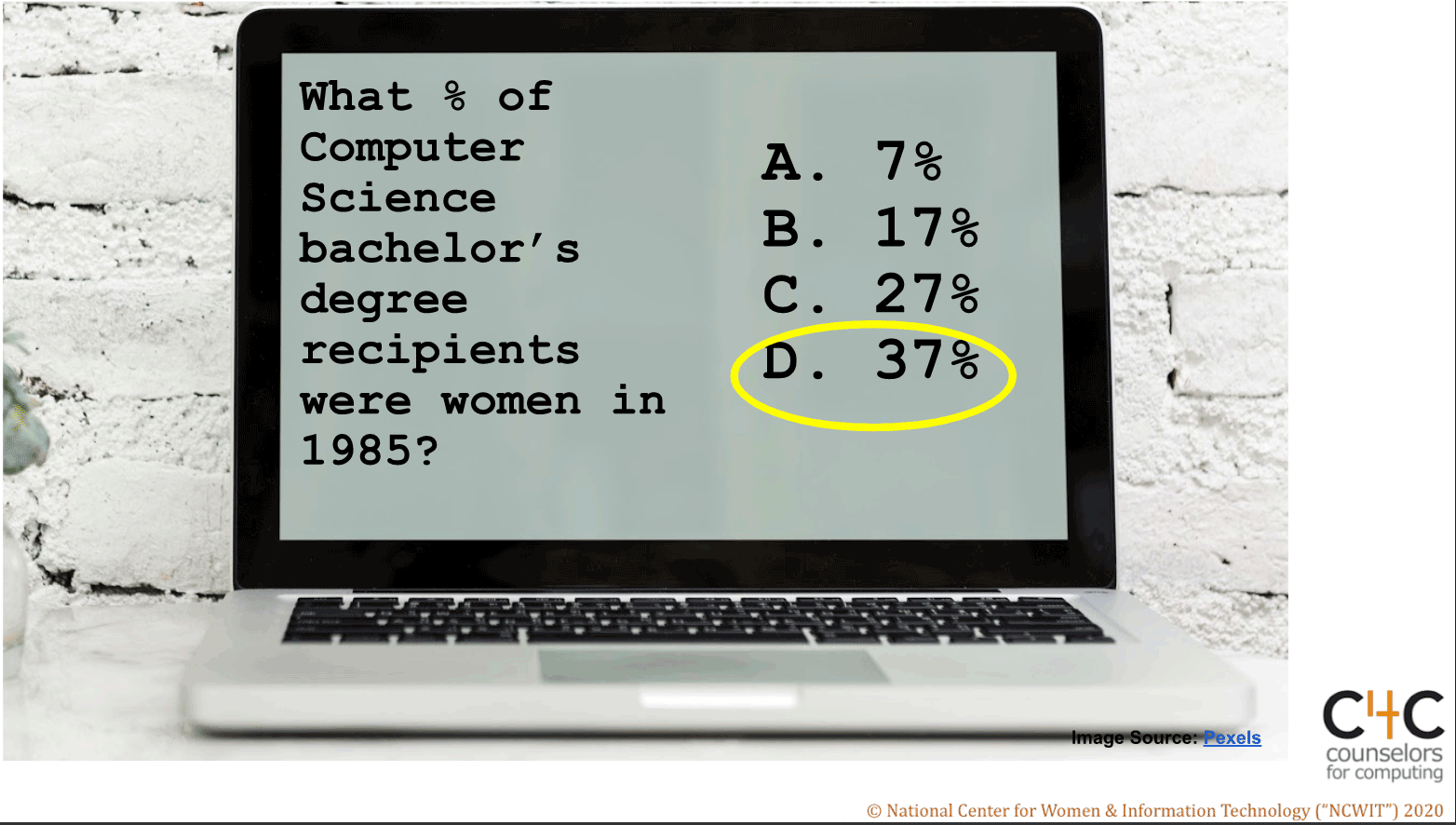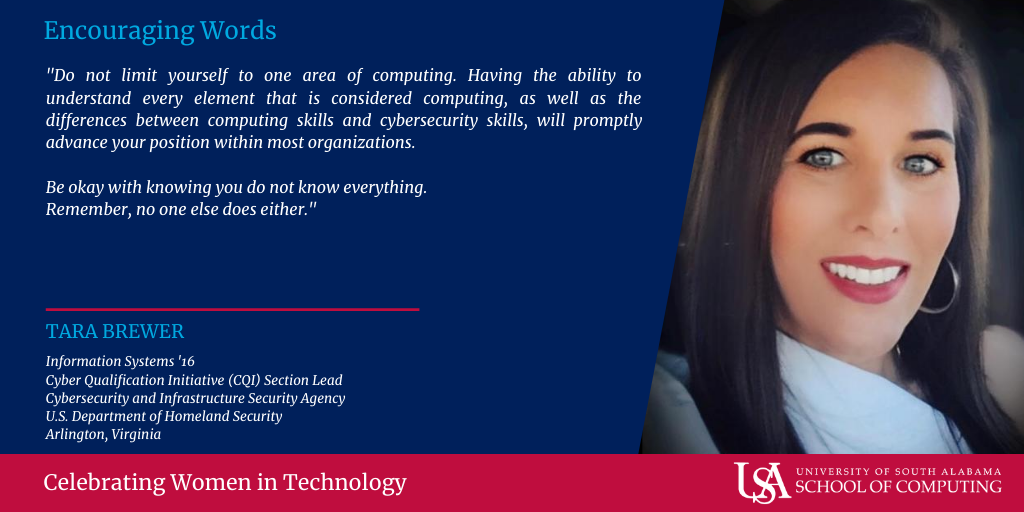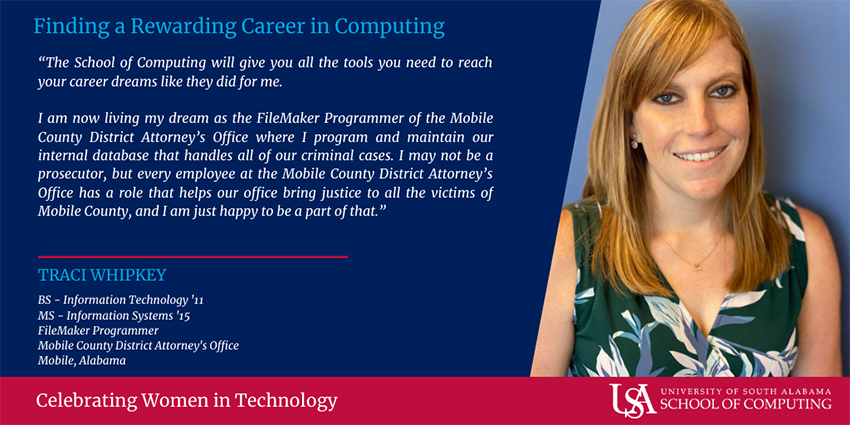Celebrating Women in Technology Throughout September
Grace Hopper helped create the first compiler for computer language, she was also
the first female recipient of the National Medal of Technology in 1991, and she was
the first woman to receive a doctorate degree in Mathematics. Grace Hopper has paved
the way for women in technology, and she opened doors to opportunities for women to
enact change in computing field.
In honor of the Annual Grace Hooper Celebration and September Women in Technology
Month the School of Computing will be running its FIRST SoC Women in Technology Month.
We will share stories and highlight accomplishments of our School of Computing Women
in Technology. Join us daily on Social Media and our Website throughout the Month
of September to hear from women of the School of Computing past, present, and future!

What % of Computer Science bachelor's degree recipients were women in 1985?

What % of Computer Science bachelor's degree recipients were women in 2018?
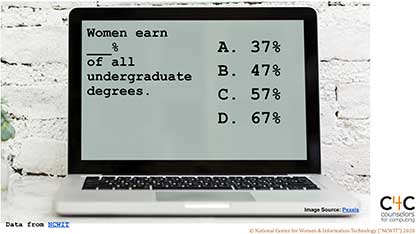
Women earn _% of all undergraduate degrees.
Aspiring Women in Technology Scholarship
The Aspiring Women in Technology Scholarship was created in November 2018 with an
initial contribution from the National Center for Women and Information Technology
(NCWIT). The annual scholarship benefits students who are underrepresented in the
computing discipline and promotes diversity in the student population.
Celebrate Women in Technology month by making a tax-deductible gift today! Gifts
in any amount will be matched dollar for dollar through USA’s Mitchell-Moulton Scholarship
Initiative, doubling your impact on School of Computing students.
GIVE NOW
Alumni Spotlight - Dr. Debra Chapman
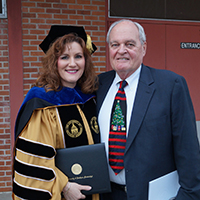
Dr. Debra Chapman
1997 Graduate
Interim Associate Dean, Graduate Director and Associate Professor
USA’s School of Computing
“If you are thinking about or pursuing a career in computing, you need to develop
a strong sense of what you want to do with your life and go after it, without letting
anything or anyone get in your way. Women can, and do, succeed at computing.”
These words of inspiration come from Dr. Debra Chapman, interim Associate Dean, Graduate
Director and Associate Professor in USA’s School of Computing. Dr. Chapman’s education
and life story exemplifies her philosophy, and we are honored to share her alumni
story during Women in Technology month.
Read More about Dr. Chapman
Wayback Wednesday with Rhonda Lucas
Instructor
Information Systems and Technology
▼ What did you study while you were a student here at South? (Don't worry I'm not asking
what years)
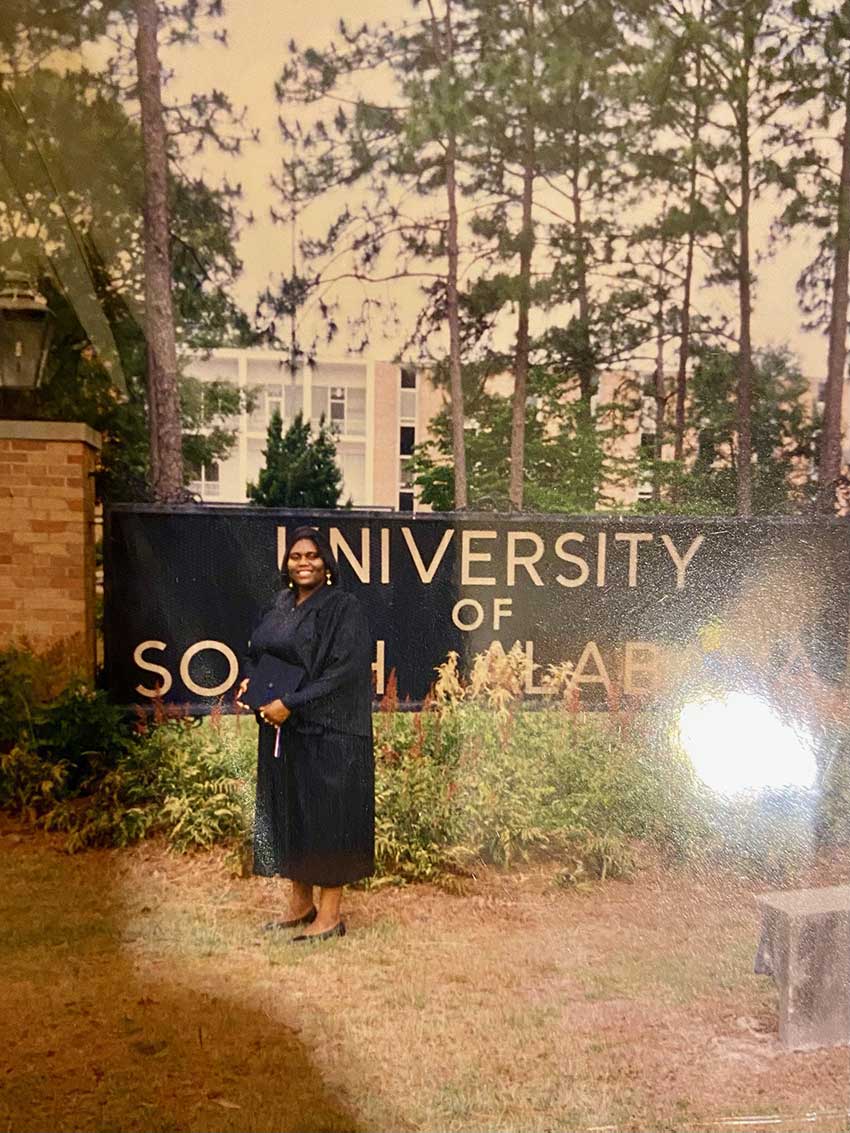
I completed my bachelor's degree in Management Information Systems from the Mitchell
College of Business at South Alabama. Then I worked in industry (EDS, Konica-Minolta,
and Mentor Graphics) for several years in various positions (tech support/help desk,
Quality Assurance engineer, software engineer, and technical marketing engineer).
I returned to the university to complete my master's degree part-time in Computer
Information Systems from the School of Computing. I had dual careers. I was a software
engineer during the day and an adjunct instructor (Bishop State Community College,
Faulkner State Community College, Loyola University, etc.) at night. My first full-time
teaching position was at Spring Hill College. I returned to the School of Computing
in August 2015 as a full-time instructor and a Ph.D. student. I am now a Ph.D. candidate
in the School of Computing. I guess it is true what they say..."there is no place
like home" because something keeps bringing me back home to the University of South
Alabama.
▼ What made you decide to pursue your degree in Computing?
I decided to pursue a degree in computing after taking a Basic programming course
in the magnet program at John L. LeFlore High School. I loved it! My instructor,
Ms. Clark, kept talking about her graduate classes that she was taking at the University
of South Alabama. She always talked about her learning experiences in Dr. Feinstein's
class. I came to a USA "Get Acquainted Day" one Saturday and I met Dr. Feinstein!!
I was so excited because I felt like I knew him already because my teacher talked
about him so much. South Alabama won me over at the "Get Acquainted Day".
▼ Was there a person or a group that really encouraged and motivated you?
I was blessed to have had so many cheerleaders in my life-my parents, my brother,
my family, my church members, and my family friends. I would call home crying because
I could not get something compiled or would have more pages of errors than working
code. But my Moma would let me vent from the computer lab phone and say, "Ok. Call
me when you get back to your dorm room." Some cheerleaders are going to be your cheerleaders,
regardless. But there were two people that cheered for me that was part of my South
Alabama family-Dr. Dale T. Adams and Ms. Jarmora Hill Valrie. I remember Dr. Adams
telling me and a few of my other friends that he wanted us to work at South Alabama
after graduation. Manifestation is real. Because I am here working at South today.
And one of the other students is currently the Dean of Students. Who knew? Dr.
Adams believed in me and for that I am grateful. Jarmora always knew when to drop
me a card just when I needed it.
I still have her cards to this day. When the imposter syndrome kicks in, I read one
of the cards from her for a little encouragement.
▼ How have you seen Computing change since you first started?
I always tell my students the following: "The good thing about technology is that
it is always changing. The bad thing about technology is that it is always changing."
A computing career is very dynamic. It is not the same job every day. A computing
career is filled with challenges and charms. If you love problem-solving and trouble-shooting,
then a computing career is for you. I tell my students that you can have a career
in computing and not program one line of code. There are a plethora of opportunities
available to anyone interested in computing regardless of your age, gender, or ethnicity.
#ComputingCareersRock
▼ What was your favorite class in Computing?
My favorite and my hardest course was the data structure series (CIS 140, 141, and
142). The course focused on programming in C++ and my instructor was Dr. Doran. He
was an excellent teacher. He would work with me after class in his office every week.
He never gave up on me. He never made me feel dumb or like I didn't belong. I loved
his teaching style. He helped me to create my Aha! moment. After his class, I knew
I really belonged in computing. He taught problem-solving and honed my critical thinking
skills. He taught me how to take a difficult problem and break it into a smaller
problem whether it was the Towers of Hanoi, the peg game on the tables at Cracker
Barrel, March Madness brackets, or the comp question about his wife's garden. My
favorite phrase from him was "Data structures are your friend!". Every time I say
the words-problem solving, algorithms, traverse, and many other data structure terms...I
think of Dr. Doran. I strive to be that type of instructor to my students.
▼ What is your favorite memory of being a student at South?
My favorite memory of being a student at South was being involved in everything South
Alabama!!!!! I have at least 50 million South Alabama t-shirts from my involvement
with all the organizations. I am a native Mobilian, but I lived on campus. That
was the best decision ever. I was very active with the Black Student Union and I
got a chance to meet Maya Angelou, Cicely Tyson, KRS One, Dexter King (Dr. Martin
Luther King, Jr.'s son), Margaret Walker, and many more iconic figures. It was life-changing
to meet so many famous people. I got a chance to talk to a few of them one on one
and ask questions. I felt like I was in a living history book. I also have favorite
memories of all the life long friendships (roommates, sorors, professors, mentors,
etc.) that I made as a student at South Alabama. South afforded me the opportunity
to grow intellectually, academically, emotionally, spiritually, and personally through
all the relationships that I made and I am still making as a student.
▼ What organizations, if any, were you involved in while you were a student?
I was an active member of several organizations on campus. Some of the organizations
included: the Association of Computing Machinery (ACM), Phi Chi Theta Business Fraternity,
the Black Student Union, Student Government Association, Jaguar Production, Residence
Life Council, Greek Life Council, Fab 50 Orientation Group, Mortar Board, Abeneefuo
Kuo Honor Society (ABK), and the Iota Nu Citywide Chapter of Delta Sigma Theta Sorority,
Incorporated. I had to learn how to be a well-rounded student during my undergraduate
years. It was my first test at creating a work-life balance.
Celebrating Women in Technology
Read all the Women in Technology Features







